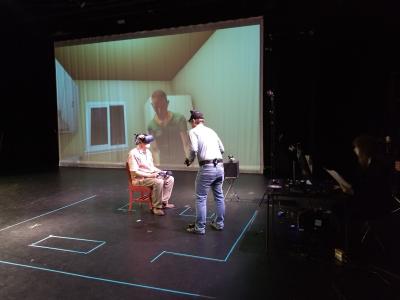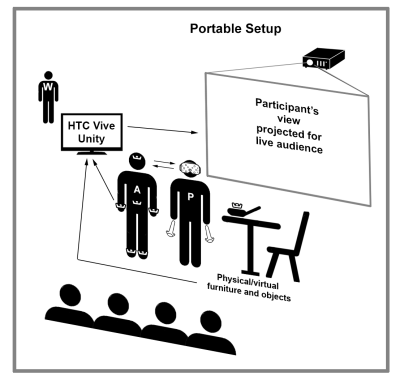Perspective Taking in Dementia Care with Virtual Reality Simulation
Summary
With 5.7 million individuals living with dementia in the U.S., there will be increased demands on physicians as they care for these patients. Using innovative interventions to support the development of clinical empathy among healthcare practitioners has the potential to increase quality of care and positive health outcomes. Virtual Reality (VR) provides the unique opportunity to enable a participant to step into the perspective of another individual. Perspective-taking in VR has been shown to reduce negative stereotyping and increase empathy for individuals immersed in simulated interactions (Yee & Bailenson, 2006).
ACCAD’s Virtual Reality Performance Platform for Learning about Dementia (VR-ED) immerses the participant in an interactive semi-scripted scenario with a live actor performing the role of a caregiver through a virtual avatar.
During a 15–20-minute immersion, the participant experiences daily challenges and interactions from the perspective of a person living with dementia, whose dementia progresses over a year-long period.
ACCAD’s VR design enables real-time changes to the virtual environments and scenario interactions, simulating the effects of memory loss and time disorientation for the participant. Through their unscripted improvised response, the participants are free to explore different verbal and emotional reactions in order to understand potential emotions that may occur in those living with dementia. Both the immersed participant and the audience also observe the effect of these changes on participant-caregiver interactions. The simulation is followed by a debriefing workshop led by a trained social worker.
Project Team
Faculty and Staff
Maria Palazzi, ACCAD, Department of Design
Holly Dabelko-Schoeny, College of Social Work
Ian E. Murphy, College of Social Work
Vita Berezina-Blackburn, ACCAD
Alex Oliszewski, ACCAD, Department of Theatre
Jeremy Patterson, VR developer
Daniel Montour, Actor
Graduate Students
Dreama Cleaver, MFA, Department of Design/ACCAD
Victoria Campbell, MFA Candidate, Department of Design/ACCAD

Live actor Alex Oliszewski interacts as an avatar with a volunteer for the Dementia VR Patient experience.

The portable immersive performance system allows for the project to travel to remote locations. It was utilized for delivering the simulation training to several medical practitioner groups throughout the state of Ohio in 2019-2020 (pre-pandemic).
Pre-pandemic our research team was able to test this simulation with approximately 140 healthcare workers in Central Ohio. Preliminary qualitative themes from the post-simulation focus group include: (1) The ability of the Resident to take the perspective of the individual with dementia and/or their caregiver; (2) Residents feeling as though they learned from the experience; (3) Residents planning to change their practice as a result of the experience; and (4) Residents expressed feelings of powerlessness regarding ability to help patients and their caregivers.
This project was supported by a grant from the Medicaid Equity Simulation Project SFY 2018 & 2019, Ohio Department of Medicaid.
The content of this site is solely the responsibility of the authors and does not necessarily represent the official views of the Ohio Department of Medicaid.
